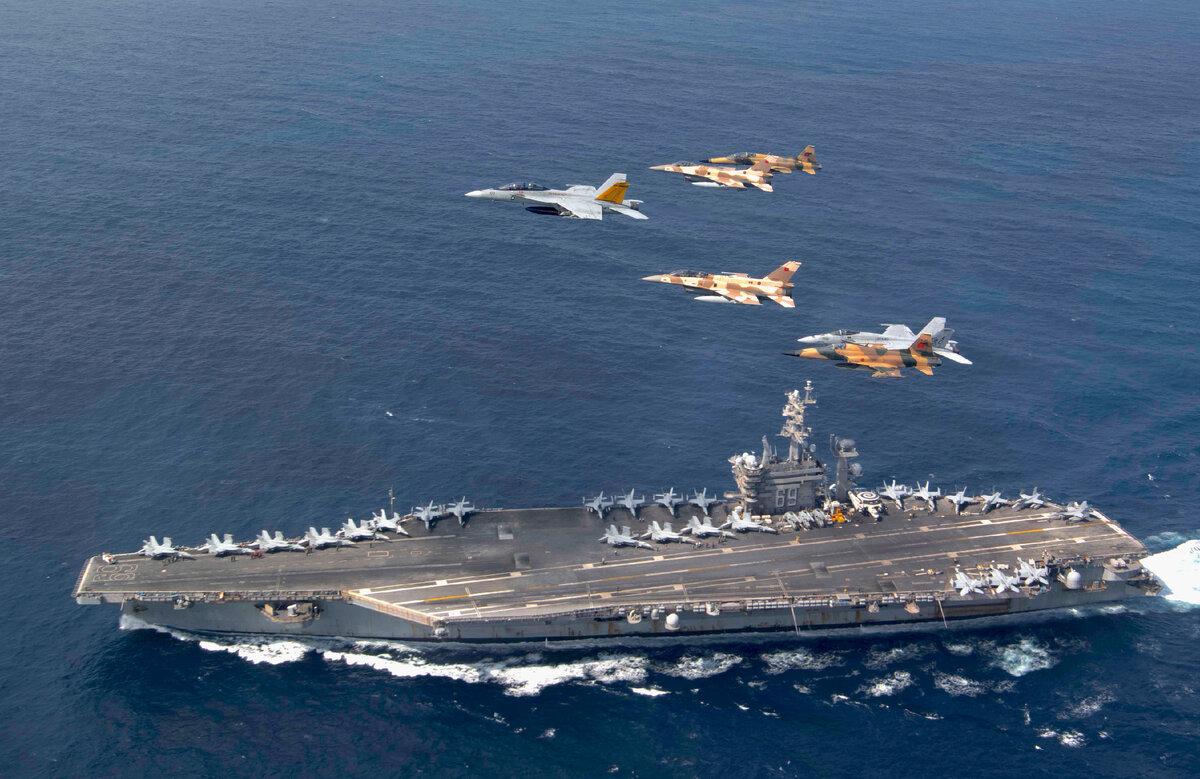On the night of Friday, January 12, the United States and the United Kingdom launched missile strikes against the Houthis in Yemen. The reason is the threat to shipping in the Red Sea. The rapid execution of the operation raises a pertinent question: why is the White House delaying military assistance to Ukraine? The absence of timely deliveries of weapons and ammunition places Kyiv in an exceedingly challenging position in the war against Russia. Apostrophe explores in this article the reasons behind the delay and outlines potential outcomes for Kyiv in its dealings with Western allies.
On the night of January 12, 2023, the United States and Great Britain launched strikes against the Houthis in Yemen. The motive behind these actions was the ongoing systematic attacks by local rebels on ships in the Red Sea, without delving into specific foreign policy details.
As per President Joe Biden, the Houthis conducted 27 attacks on global commercial vessels involving over 50 countries, and crews from more than 20 countries were threatened or taken hostage.
Subsequent information revealed that the strikes targeted Yemen's capital, Sana'a, and the Al-Dulaimi airbase. Additional targets included a camp east of Saada city, areas near Al-Hudaydah Airport, Ta'izz International Airport, and the coastal region of Abs Districts.
On the night of January 13, Yemen faced renewed missile strikes. Concurrently, amid a swift Middle East operation, the United States declared a halt in aid to Ukraine. National Security Council Coordinator John Kirby clarified that U.S. assistance is on hold pending Congressional approval for new funding.
Kirby stated that the U.S. exhausted its funds with the last $250 million military aid package announced on December 27, 2023.
“The assistance that we provided has now ground to a halt. The attacks that the Russians are conducting are only increasing. And now, as I talked about earlier this week, they’re using North Korean ballistic missiles to do their dirty work,” Kirby said.
In light of this, a valid question emerges: why did our Western allies swiftly respond to the actions of a small paramilitary group like the Houthis, yet display insufficient interest in Putin's aggressive actions against Ukraine, failing to provide the necessary weaponry?
According to international political analyst Maksym Yali, the West prioritizes its own interests above all else.
‘In the eyes of the Biden administration and Trumpist factions hindering military aid sufficient for us to at least withstand, let alone reclaim our territories, the defeat of Russia is nоt aligned with the national interests of these political elites. Otherwise, comprehensive support would be provided for our efforts, including territorial de-occupation,’ Yali comments.
‘Unfortunately, the Americans adhere to their anti-escalation doctrine. Had Putin received a slap on the wrist early on, the war would likely be wrapped up by now,’ Mykhailo Honchar, president of the Strategy XXI Center for Global Studies, notes in a comment to Apostrophe.
The analyst suggests that the United States and Britain could have offered significantly greater support to Ukraine since the beginning of Russia's war with Ukraine.
‘The U.S. and UK could establish a protective umbrella spanning from Odessa to the Bosphorus over the Black Sea, safeguarding Ukraine against potential missile threats from Russian ships. This strategic move, though bold, was not executed. Taking matters into our own hands, we did it ourselves. We were able to drive the Black Sea Fleet of Russia into a bottle with our weapons,’ Honchar says.
‘On December 14, the U.S. Congress approved the Defense Budget Act, compelling the president to task the National Security Council with crafting an interagency strategy for the Black Sea region and its states. Historically, U.S. attention gravitated towards the North Atlantic, Indo-Pacific, and Arctic, relegating Black Sea matters to the sidelines. It is only recently that the region has garnered heightened focus,’ expert explains.
According to Honchar, tangible evidence of this shift lies in the formation of a mine countermeasure group comprising three NATO Black Sea states: Romania, Bulgaria, and Turkey.
Nevertheless, Honchar remains confident that developments in the Red Sea will not impact the provision of weaponry to Ukraine from the USA and Britain.
‘The U.S. and British strikes against the Houthis involve Tomahawk missiles, which aren't tailored to Ukraine's needs. There's no discussion of providing "Tomahawks" to Ukraine at al. However, British Prime Minister Rishi Sunak's recent visit to Kyiv, coupled with the announcement of a new aid package, signals the continued support in the form of weaponry,’ Honchar asures.
Serhii Danylov, the deputy director of the Center for Middle Eastern Studies, aligns with Honchar's perspective.
‘The current conflict around the Red Sea and the Houthis will not impact weapon supplies to Ukraine, as it revolves around different types of weaponry and ammunition’, he commented.
‘The arms supply to Ukraine and the Yemen strikes are unrelated. The USA and Britain view Yemen and Ukraine as separate issues, ensuring a continuous provision of weapons,’ analyst of the Ukrainian Institute of the Future Ilya Kusa comments.
Kusa suggests that the USA and Britain seek an end to the war in Ukraine, but only on terms favorable to them, with no current conditions supporting such a resolution.
‘While the Americans claim to have halted aid to Ukraine, that's not accurate. Kirby's statement seems designed to influence domestic opposition. With U.S. elections underway, it's seen as pre-election rhetoric, frustrating but beyond our control,’ Honchar concludes.


